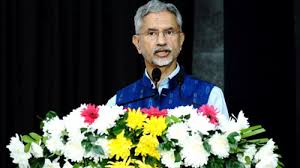The more fractured the world becomes, the stronger the case for India’s strategic autonomy.
In a couple of speeches this week on Delhi’s diplomatic challenges, External Affairs Minister S Jaishankar elaborated on several essential concepts that are being debated amid a sense of greater uncertainty in India’s foreign policy, thanks to the new difficulties in ties with the US. Jaishankar seeks to define India’s much-vaunted “strategic autonomy” not as an abstract ambition or as an end in itself. He sees it as a pragmatic methodology for India’s engagement with the major powers at a time of significant change in the inter-se relations of the US, Europe, Russia, and China. He reminds us that Delhi did not align with any one power even when India was much weaker in the early decades after Independence. As India has become stronger, its emphasis on seeking freedom of choice is not a slogan but intrinsic to its great power relations. He insists that the objective of strategic autonomy is to use relations with all the major powers to accelerate India’s rise and emerge as an important pole in the international system.
Jaishankar underlines that strategic autonomy is not automatic. It is linked deeply to India’s adaptability and resilience. He argues that “handling change continuously… means you have to keep revising, keep refreshing, keep adjusting, keep recalculating… and you can’t do that if you are tied to somebody else”. Put simply, the methodology of strategic autonomy depends on active and dynamic assessment of the external environment. Jaishankar cautions against conflating strategic autonomy with indecision. In the recent past, India had often paralysed itself in addressing the new strategic opportunities. According to Jaishankar, the more fractured the world becomes, the stronger the case for strategic autonomy — India must avoid “sitting on the fence”, but also resist being coerced into taking sides simply for the sake of alignment.
Jaishankar addressed the growing concern in foreign policy circles about the emerging “re-hyphenation” with Pakistan. Over the last two decades, India had successfully separated itself from the Pakistan factor. The unanticipated warmth between the Trump Administration and Pakistan in the last few weeks, and the US President’s claims about brokering peace between India and Pakistan in the four-day conflict in May, have been at the source of this anxiety. Jaishankar underlines the importance of crafting foreign policy without being boxed in by adversarial neighbours or externally imposed equivalences. Citing historical comparisons made between India and Pakistan in the 1970s, he notes that such equivalences have dissipated primarily thanks to India’s growth and international salience. As he put it, “The best way of de-hyphenation is to outstrip the other party in terms of power and capability.” With India’s economy now 10 times larger than Pakistan’s, any talk of hyphenation is meaningless. Yet it is the Pakistan obsession of the ruling party — including the politicisation of cricket matches — that is producing Delhi’s self-induced hyphenation with Islamabad. The drumbeat of anti-Pakistan rhetoric in Delhi signals a lack of political self-assurance, and worse still, it provides political oxygen at home and abroad to an army-led government that captured power through a rigged election in Islamabad. Separating the Pakistan policy from the domestic political calculus of the ruling party is the best guarantor of preventing India’s re-hyphenation with Pakistan.
